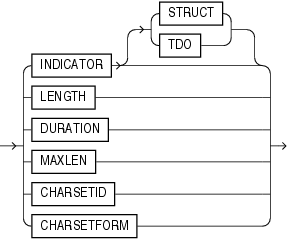13.7 Call Specification
A call specification declares a Java method or a C language subprogram so that it can be invoked from PL/SQL. You can also use the SQL CALL statement to invoke such a method or subprogram. The call specification tells the database which Java method, or which named subprogram in which shared library, to invoke when an invocation is made. It also tells the database what type conversions to make for the arguments and return value.
Topics
Prerequisites
To invoke a call specification, you may need additional privileges, for example, EXECUTE privileges on a C library for a C call specification.
Syntax
call_spec ::=
java_declaration ::=
c_declaration ::=
external_parameter ::=
property ::=
Semantics
call_spec
Maps a C procedure or Java method name, parameter types, and return type to their SQL counterparts.
Call specifications can appear in PL/SQL standalone subprograms, package specifications and bodies, and type specifications and bodies. They cannot appear inside PL/SQL blocks.
java_declaration
string
Identifies the Java implementation of the method.
c_declaration
LIBRARY lib_name
Identifies a library created by the "CREATE LIBRARY Statement".
EXTERNAL
Deprecated way of declaring a C subprogram, supported only for backward compatibility. Use EXTERNAL in a C call specification if it contains defaulted arguments or constrained PL/SQL types, otherwise use the LANGUAGE C syntax.
Examples
Example 13-4 External Function Example
The hypothetical following statement creates a PL/SQL standalone function get_val that registers the C subprogram c_get_val as an external function. (The parameters have been omitted from this example.)
CREATE FUNCTION get_val
( x_val IN NUMBER,
y_val IN NUMBER,
image IN LONG RAW )
RETURN BINARY_INTEGER AS LANGUAGE C
NAME "c_get_val"
LIBRARY c_utils
PARAMETERS (...);Related Topics
In this chapter:
In other chapters:
In other books:
-
Oracle Database SQL Language Reference for information about the
CALLstatement -
Oracle Database Development Guide for information about restrictions on user-defined functions that are called from SQL statements
-
Oracle Database Java Developer's Guide to learn how to write Java call specifications
-
Oracle Database Development Guide to learn how to write C call specifications




